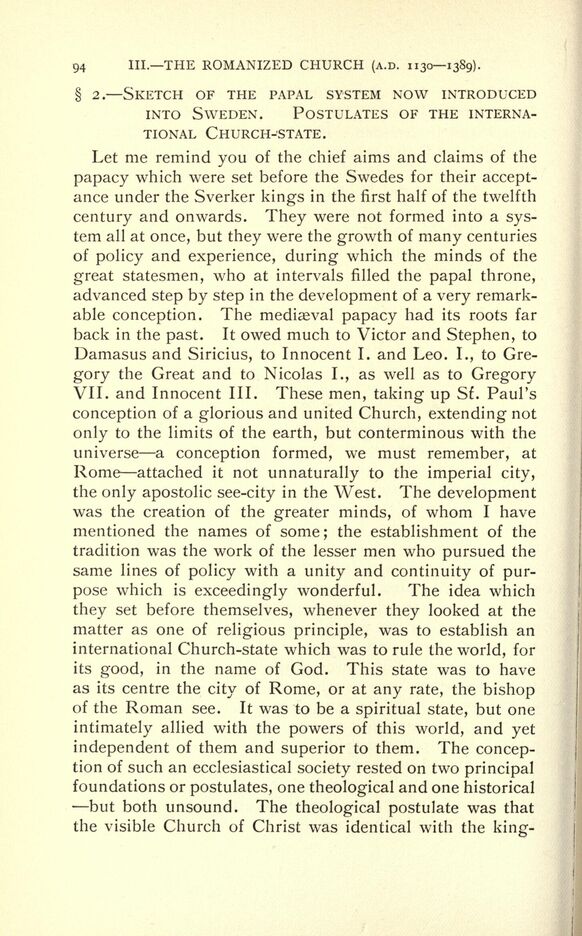
Full resolution (JPEG) - On this page / på denna sida - III. The Romanized Church under the Sverkers, Erics and Folkungar (1130—1389 A.D.)

<< prev. page << föreg. sida << >> nästa sida >> next page >>
Below is the raw OCR text
from the above scanned image.
Do you see an error? Proofread the page now!
Här nedan syns maskintolkade texten från faksimilbilden ovan.
Ser du något fel? Korrekturläs sidan nu!
This page has never been proofread. / Denna sida har aldrig korrekturlästs.
94 III. THE ROMANIZED CHURCH (A.D. 11301389).
2. SKETCH OF THE PAPAL SYSTEM NOW INTRODUCED
INTO SWEDEN. POSTULATES OF THE INTERNA
TIONAL CHURCH-STATE.
Let me remind you of the chief aims and claims of the
papacy which were set before the Swedes for their accept
ance under the Sverker kings in the first half of the twelfth
century and onwards. They were not formed into a sys
tem all at once, but they were the growth of many centuries
of policy and experience, during which the minds of the
great statesmen, who at intervals filled the papal throne,
advanced step by step in the development of a very remark
able conception. The mediaeval papacy had its roots far
back in the past. It owed much to Victor and Stephen, to
Damasus and Siricius, to Innocent I. and Leo. I., to Gre
gory the Great and to Nicolas I., as well as to Gregory
VII. and Innocent III. These men, taking up Sf.. Paul s
conception of a glorious and united Church, extending not
only to the limits of the earth, but conterminous with the
universe a conception formed, we must remember, at
Rome attached it not unnaturally to the imperial city,
the only apostolic see-city in the West. The development
was the creation of the greater minds, of whom I have
mentioned the names of some; the establishment of the
tradition was the work of the lesser men who pursued the
same lines of policy with a unity and continuity of pur
pose which is exceedingly wonderful. The idea which
they set before themselves, whenever they looked at the
matter as one of religious principle, was to establish an
international Church-state which was to rule the world, for
its good, in the name of God. This state was to have
as its centre the city of Rome, or at any rate, the bishop
of the Roman see. It was to be a spiritual state, but one
intimately allied with the powers of this world, and yet
independent of them and superior to them. The concep
tion of such an ecclesiastical society rested on two principal
foundations or postulates, one theological and one historical
but both unsound. The theological postulate was that
the visible Church of Christ was identical with the king-
<< prev. page << föreg. sida << >> nästa sida >> next page >>